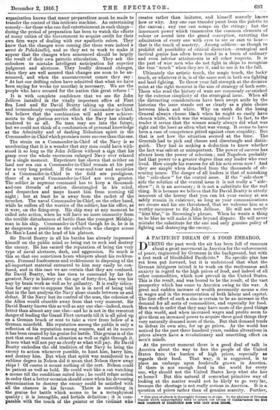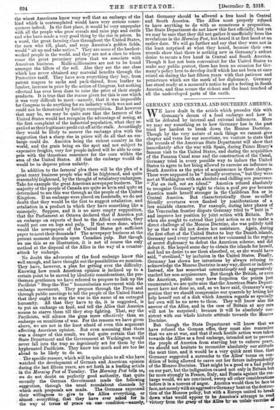A PACIFICIST DREAM OF A FOOD EMBARGO.
DURING the past week the air has been full of rumours about a great movement in America for the enforcement of peace, engineered by Germans in the background, but with a first rank of blindfolded Pacificists.* No specific plan has yet been put forward, but it is understood that what the German intriguers intend is to work on the restlessness and anxiety in regard to the high prices of food, and indeed of all other commodities, which now prevail in the United States. This is the result, and was bound to be the result, of the vast prosperity which has come to America owing to the war. A great and sudden increase of wealth necessarily means a rise in wages and in the remuneration of both labour and capital. The first effect of such a rise is certain to be an increase in the demand for all sorts of commodities, and especially for food. Men work in order that they may have more of the good things of this world, and when increased wages and profits seem to give them an increased power to acquire these good things they very naturally demand more of them. But that demand tends to defeat its own aim, for up go prices. As the world has noticed for the past three hundred years, sudden alterations in prices always have a revolutionary and unsettling effect on men's minds.
At the present moment there is a good deal of talk in America about the way to free the people of the United States from the burden of high prices, especially as regards their food. That way, it is suggested, is to place an embargo upon foodstuffs grown in America. If there is not enough food in the world for every one, why should not the United States keep what she has at home ? But this natural if somewhat primitive way of looking at the matter would not be likely to po very far, because the shortage is not really serious in America. It is a question of prices rather than of genuine scarcity. Further, • This plan of attack is thoroughly German in (halo. In the phalanx of Prussian Guards which unsuccessfully tried to attack our troops at Contairisison the dna sank consisted of blindfolded pan with their a= UAW. the wisest Americans know very well that an embargo of the kind which is contemplated would have very serious conse- quences indeed. In the first place, it would be very unpopular with all the people who grow cereals and raise pigs and cattle and who have made a very good thing by the rise in prices. In a word, the great farming class throughout the United States, the men who till, plant, and reap America's golden fields, would " sit up and take notice." They are some of the hardest- worked people in the world, and they are not a class to whom come the great pecuniary prizes that we associate with American business. Multi-millionaires are not to be found amongst the tillers of the soil. Also they are the one class which has never obtained any material benefits through the Protective tariff. They have seen everythine° they buy, from patent reapers to sacks and pack-thread, from leather to lumber, increase in price by the action of Congress, but nothing effectual has ever been done to raise the price of their staple products. It is true that the reason given for this is one which it was very difficult to meet—namely, that it was impossible for Congress to do anything for an industry which was not and could not be threatened by foreign competition. But however that may be, we may be quite sure that the farmers of the United States would not recognize the advantage of seeing, at the first complaint of the industrial population, what they re- gard ed as their legitimate profit cut off at the stalk. Accordingly they would be likely to answer the embargo plea with the suggestion that a sharp rise in prices will do all that an em- bargo could do. America being the richest country in the world, and the grain being on the spot and not subject to expensive freights, very few people indeed will be able to com- pete with the nimencen consumer for the corn within the' area of , the United States. All that the embargo would do would be to depress prices unfairly.
In addition to the farmers' plea there will be the plea of a great many _business people who will be frightened, and quite' reasonably frightened, by the thought of retaliatory embargoes. Take for example the great American newspaper business. The majority, of the people of Canada are quite as keen and quite as determined to -see this war through as the people of the United ' Kingdom. 'If an embargo NWM- placed on foodstuffs, we do not doubt.that -they would be the first to suggest retaliation, and retaliation in a product in which they have something like a monopoly. Suppose, and it is no mere empty supposition, that the Parliament at Ottawa declared that if America ,put an embargo on exports of food to the Allied countries, they would put one on. logs and pulp. If that were done, where would the newspapers of the 'United States, get sufficient paper to meet their demands I The newspaper business at the present moment depends upon Canadian. pulp. _But though we use this as an illustration, it is not of course the only method at, the disposal of the Allies in the way of a counter- attack by ein.bargo.
No doubt the advocates of the- food embargo know this well enough, and have thought out the possibilities we mention. They have, however, a plan for gettmg over the difficulty. Knowing . how much American opinion is inclined up to a certain point to be moved by idealistic considerations, the pro- German gentlemen we have referred to propose to link up the • Pacificist Stop-the-War" humanitarian movement with the: embargo movement. They propose through the Press and through public meetings to tell the people of the United States that they ought to stop the war in the name of an outraged humanity. All that they have to do, it is suggested, is, to put an embargo on food, and tell the Allies that America means to starve them till they stop fighting. That, say the Pacificists, will silence the guns more effectively than an embargo on munitions of war. For the reasons we have given above, we are not in the least afraid of even this argument - affecting American opinion. But even assuming that there, was, a danger of this , result, we feel quite certain that the State Department and the Government at Washington Isola never fall into the trap so ingeniously set for them by the hyphenated Pacificists. They know too much and see too far, ahead to be likely to do so.
The specific reasons, which will be quite plain to all who have watched the development of. German and American. opinion' during the last fifteen years, are set forth in a leading article in the Morning. Post of Tuesday. The Morning Post tells us, we do not doubt on perfectly good authority, that quite: recently the German Government made the following suggestion, through the usual roundabout channels by which such proposals are made. The Germans expressed, their willingness to give to the Allies everything, or ahmoat.-everything, that they have ever asked for in the way of terms of peace on one - condition—namely, that Germany should be allowed a free hand in Central and South America. The Allies most properly refused to have anything to do with so monstrous a proposition. The State Department do not know this fact officially, but yet we may be sure that they did not gather it unofficially from the revelations in the Morning Post,. but heard it at first hand at an earlier date. We will go further and say that they were not in the least surprised at what they heard, because their own records show that there is nothing new in Germany's ardent desire to secure a free hand in Central and South America. Though it has not been convenient -for the United States to make any public protest, there has been no occasion for Ger- many's policy here to develop itself which has not been at once seized on during the last fifteen years with that patience and persistence which are the mark of her diplomacy. Germanyy has stood ready at a moment's notice to get a footing in South America, and thus secure the richest and the least touched of all the undeveloped parts of the earth.













































 Previous page
Previous page